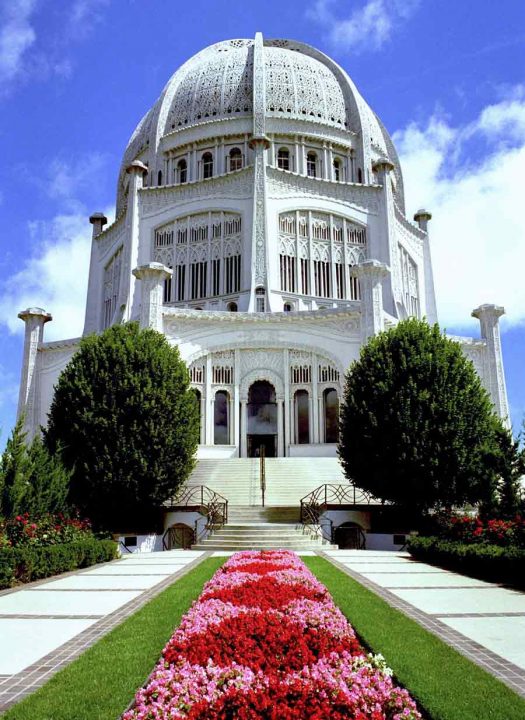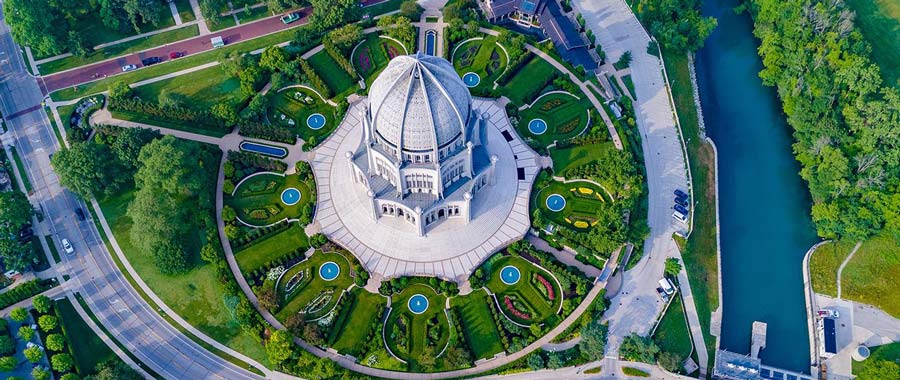The views expressed in our content reflect individual perspectives and do not represent the authoritative views of the Baha'i Faith.
There is a unity apparent in the Spring of 2020 as the world grapples with the coronavirus pandemic. An oft-quoted expression these days is that “We are all in this together.” But there is also a sense of desperation about our “new normal” and how and when can we “open the economy”?
On the surface, this unity ignores how this pandemic fits into the much larger picture of humanity’s abuse of the Earth. More than a century ago, Baha’u’llah, the prophet and founder of the Baha’i Faith wrote, “…ye walk on My earth complacent and self-satisfied, heedless that My earth is weary of you and everything within it shunneth you….”
The abuse of the Earth has been noted by many modern-day experts and leaders. In September 2019, teen environmental activist Greta Thunberg gave a speech to the United Nations where she laid out in stark terms what the consequences are for her generation. “You have stolen my dreams and my childhood with your empty words and yet I’m one of the lucky ones,” Greta said. “People are suffering. People are dying. Entire ecosystems are collapsing. We are in the beginning of a mass extinction and all you can talk about is money and fairy tales of eternal economic growth. How dare you!”
And in April, Pope Francis called the coronavirus pandemic, “one of ‘nature’s responses’ to human beings ignoring the ecological crisis.” The Pope noted the lack of response to previous signs of environmental catastrophe. “Who now speaks of the fires in Australia, or remembers that 18 months ago a boat could cross the North Pole because the glaciers had all melted? Who speaks now of the floods?” he said. “I don’t know if these are the revenge of nature, but they are certainly nature’s responses.”
We’ve all worked hard in our “essential” and “non-essential” ways to conquer the coronavirus, which attacks and destroys the lungs of humans, we fail to work hard to conquer a foe, which attacks and destroys the lungs of the earth. Perhaps the latter dilemma is best reflected in a quote from the long-ago “Pogo” comic strip: “We have met the enemy and he is us.”
When we are the problem, we don’t know how to change, or perhaps we are just unwilling to change. Rather than society unraveling, hopefully it is re-forming in new and vibrant ways, reflecting amazing beauty — just as nature exploded this spring in color and wonder. The big question remains as we ponder cleaner skies, thousands of deaths, and weaker economies: What will our post-pandemic lives be about?
There are two images which come to mind as organizing principles for information in addressing our crises with optimism and confidence:
Image 1 – The Atmosphere
All planetary life lives within the troposphere, which extends only five to nine miles above the planet’s surface, above which are the stratosphere, mesosphere, thermosphere, and exosphere. I propose adding two new “spheres” to our thinking.

The first I call the “Personasphere” — the bubble of atmosphere stretching six feet all around us, forming a cylinder with domes above and below, like a large medicine capsule. The Personasphere is reflective these days of “social distancing,” but can have a much more profound meaning as we move forward. The second sphere is the “Communisphere,” the increasingly larger collections of life, such as our neighborhood, village, city, state, nation, and earth. The larger the sphere, the more responsibility we have for the part of the spheres above and below us. This requires ecological thinking. It is in the Communisphere where I see hope beyond the coronavirus and all pandemics.
Image 2 – The Communisphere as a “House of Worship”
Building specialized places of worship reflects the desire to create sacred spaces that take into account spirituality and the environment.
Baha’u’llah wrote: “O people of the world! Build ye houses of worship throughout the lands in the name of Him Who is the Lord of all religions. Make them as perfect as is possible in the world of being, and adorn them with that which befitteth them, not with images and effigies. Then, with radiance and joy, celebrate therein the praise of your Lord, the Most Compassionate. Verily, by His remembrance the eye is cheered and the heart is filled with light.”

The House of Worship is a building with nine sides and entrances, a dome, and gardens. It should also eventually include auxiliary facilities to help the poor, scientific and general education, medical and hospice needs, with a focus on the larger surrounding community. It changes the focus of urban planning from the “grid” of functional boxes of various types, to nodal points serving as stimuli for the nearby surrounding communities of humanity and nature.
The following is how I imagine these nine doors being entry points into what I call the Communisphere. The Baha’i quotes under the door numbers are those inscribed above the nine doors of the House of Worship for North America, located in Wilmette, Illinois. These are quotes of Baha’u’llah and begin with the quote above the main entrance.
The other quotes under doors two through nine are in sequence as one moves around the House of Worship counter clockwise. There are suggestions below each of the door quotations of how I re-imagine elements of spirit, mind, and body in the post-coronavirus world.
Door 1: Spiritual Home
“Thy heart is My home; sanctify it for My descent.” – Baha’u’llah, The Hidden Words of Bahá’u’lláh
The second part of this quote from “The Hidden Words” is “Thy spirit is My place of revelation; cleanse it for my manifestation.”
We abandon fear of pandemics and disasters — both natural and man-made — as we live in God’s dwelling: our heart. Solutions to pandemics and all great social and environmental issues call for a deeper level of learning and knowledge than simply finding more masks, PPE, requiring social distancing, dramatically cutting back on carbon emissions, or planting millions of trees. Ultimately, we retreat to sanctuaries of beauty, love, and compassion in our hearts. Moments of quiet, seeking of discernment, and reflecting with others about the new meanings of life open us up to new realities.
Door 2: Expand Awareness of Ourselves
“Breathe not the sins of others so long as thou art thyself a sinner.” – Ibid.
To heal the earth and ourselves, we must ask forgiveness from the rocks, plants, and animals, as well as those who through history who have suffered mightily, such as Native Americans and African Americans. Until we recognize our sins of greed, materialism, division, racism, and power, our goals of unity and ecology will fail. But first we must learn the language of earth and each other so that we know what to say and how to say we are sorry.
Door 3: The Refuge
“My love is My stronghold; he that entereth therein is safe and secure.” – Ibid.
We overcome fears and traumas as we center ourselves in God’s sanctuary: love. We don’t know how to translate this four-letter word into action steps, especially as we seek to “friend” nature in all its complexity. Entering God’s stronghold means I lose control.
Door 4: Resilience: The Personasphere
“The best beloved of all things in My sight is Justice; turn not away therefrom if thou desirest Me.” – Ibid.
My six-foot radius capsule dome separates me from you and nature. Injustice is part of this separation as we seek to protect ourselves from virus and the fear of “the other.” Part of our separation can be seen in our homes, where dwelling and neighborhood purposely shut out others and nature as we protect ourselves. Let us redefine “home” to embrace the sun, plants, and water — transforming dwellings into miniatures of the Cosmos. Let us build links — trails, animal corridors, and beauty walks — between my Personasphere and yours, and the larger Communisphere.
Door 5: Resilience: The Communisphere
“The earth is but one country and mankind its citizens.” – Baha’u’llah, Gleanings from the Writings of Bahá’u’lláh
Resilient communities start with everyone having a voice, vote, role, and opportunities. Everyone needs education, respect, and mentors who say “you are important and loved.” While we need physical things to protect us from crises, we also need to dramatically “renovate” our villages and cities. Re-purpose vacant offices and shopping centers as vibrant affordable mixed use villages that welcome the rich diversity of humanity. We can create gathering centers where people can work from the communisphere, and where many community support groups can meet and collaborate to create new resilience for tomorrow’s challenges and opportunities.
Door 6: Tearing Down Socially Constructed Boundaries
“The source of all learning is the knowledge of God, exalted be His Glory.” – Baha’u’llah, Tablets of Bahá’u’lláh
Our monoculture world rewards everything specialized, individualized, and monetized. It keeps us self-centered so we are ripe for all sorts of “things” to make others money.
Countering this trend which pits cyber everything versus our human and natural spirit requires a change in our educational methodologies and schools. Schools should be gardens of light — microcosms of the universe that draw us in as explorers rather than as “teachers” and “students.” We can work together in respect, mutual learning, and trust, solving the world’s problems.
Door 7: Transition to Be a Partner
“O rich ones on earth! The poor in your midst are My trust; guard ye My trust.” – Baha’u’llah, The Hidden Words of Bahá’u’lláh
The phrase “survival of the fittest” too often implies that the rich and powerful win. This is an outmoded and dangerous idea! We should build on nature’s cooperative models of evolution to show us better ways of creating societies that benefit all. We need to build affordable communities everywhere, where all can walk to school, work, and access transit, and where all people and our natural partners are valued.
Door 8: Find and Use Our Voice
“Make mention of Me on My earth, that in My heaven I may remember thee.” – Ibid.
“Making mention” goes far beyond talking about God and celebrating rituals in sacred places. What is our unique “voice” and how do we sing our “song” in this challenging and frightening time? Greta Thunberg shouldn’t have to skip school to shame us elders into action! Since we are alive today, we are called to be greater than the “greatest generation,” which means, deliberate, insistent action that will leave our planet a better place.
Door 9: Shifts From Our Physical to Spiritual Heart
“I have made death a messenger of joy to thee. Wherefore dost thou grieve?” – Ibid.
A mature forest has many fallen trees in various stages of transition from wood to earth. We can look with sorrow at the death of trees — of ourselves, and of societal structures — or we can see death as the next phase of life. As spiritual beings having a physical existence, we are challenged to move beyond clutching and collecting possessions, and beyond striving to achieve our “bucket lists” before we die. Instead, I make “legacy actions” in memory and honor of my daughter who died from cancer, and my wife and I help continue her legacy through our granddaughters ages 5, 9 and 12. Because I want all children to have opportunities just as I have had, I will do my part to change the world.
At the ninth door, we have completed the circumambulation of the House of Worship — which I call the Communisphere. The spheres identified by this physical place called me, religious group, community, city, and on up to earth, can be shallow and incomplete, or full and totally inclusive, embracing all of the messy forms of life within their transparent shells.
I’m reminded of this quote from Shoghi Effendi, the Guardian of the Baha’i Faith, which “bridges” the spirit and the environment:
“We cannot segregate the human heart from the environment outside us and say that once one of these is reformed everything will be improved. Man is organic with the world. His inner life moulds the environment and is itself also deeply affected by it. The one acts upon the other and every abiding change in the life of man is the result of these mutual reactions.”
This is the most exciting, promise-filled, and awesome time to be alive. Now is the time to build our communities in partnership with all beings.
















Comments
Sign in or create an account
Continue with Googleor